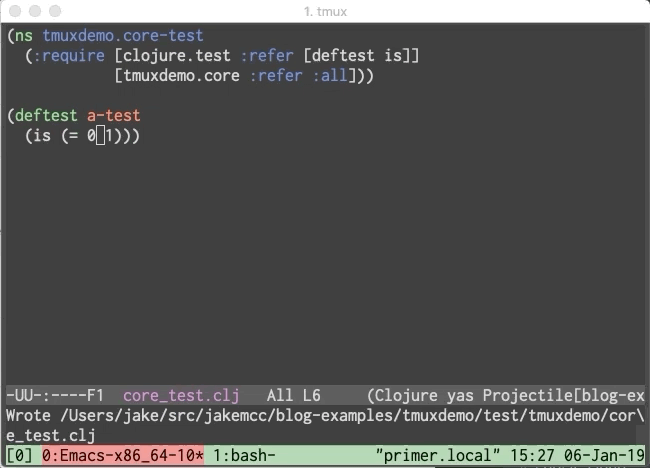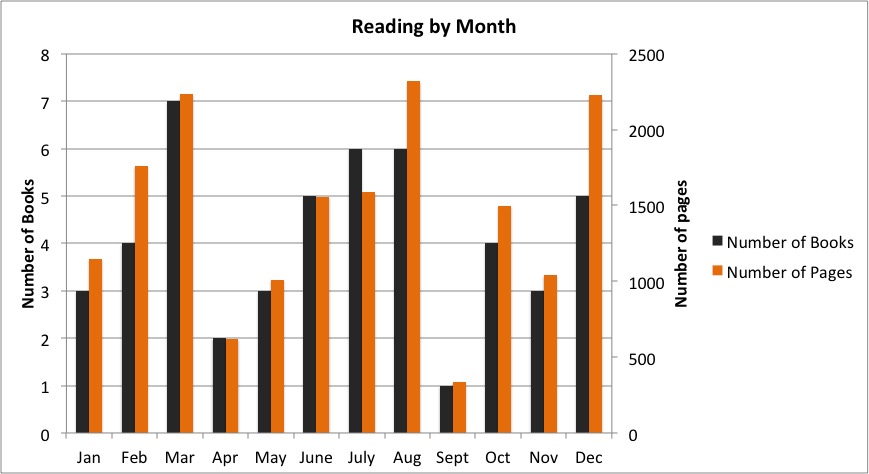At the beginning of every year I like to take the time to reflect on my previous year’s reading. It gives me a time to correct my data and think about where I want my reading to go in the upcoming year.
Here are links to my previous end-of-year reflections: 2013, 2014, 2015, 2016, and 2017.
I’ve continued to keep track of my reading using Goodreads. My profile continues to have the full list of the books I’ve read since 2010. Here is my entire 2018 record.
I slacked off a bit when writing reviews for all of my read books in Goodreads. I often didn’t write a review until some time had passed after completing the book and, as a result, I think I did a worse job reviewing books. Some books don’t even have a written review. I’m not a fan of this and will push myself some in 2019 to do a better job.
2018 Goal
There are a few more books on writing that I’ve wanted to read for a while. I’m planning on reading at least one of them this year. I’m also want to read more Octavia Butler. - Me (in the previous reading post)
That was my goal for 2018. It breaks down into two goals:
- Read at least one book on writing.
- Read more Octavia Butler.
I succeeded on the Octavia Butler goal and completely failed with the other.
2018 Numbers
I read 43 books for a total of 16,213 pages. This is a bit less than last year but still a fair amount.
Highlights
Below is a list of my five star books from 2018. The book titles link to Amazon and are affiliate links. The other links are to my Goodreads review. Unfortunately, this year I didn’t do a great job of always writing a review so some of them are missing or very short.
I generally highlight a lot of passages while reading and then rarely go back to look at them. I’ve included links to my highlights. Are they worthwhile without the context of the book? I have no idea. I’ve reread them and got something out of them but many are also so far removed from my memory that they are almost useless.
- Being Mortal: Medicine and What Matters in the End by Atul Gawande (my review, my highlights)
- Sapiens: A Brief History of Humankind by Yuval Noah Harari (my review, my highlights)
- Essentialism: The Disciplined Pursuit of Less by Greg McKeown (my review, my highlights)
- Crucial Conversations Tools for Talking When Stakes Are High by Kerry Patterson, Joseph Grenny, Ron McMillan, Al Switzler (my highlights)
- Rediscovering JavaScript: Master ES6, ES7, and ES8 by Venkat Subramaniam (my review)
- CivilWarLand in Bad Decline by George Saunders (my review)
- The Obelisk Gate (The Broken Earth #2) by N.K. Jemisin
- The Stone Sky (The Broken Earth, #3) by N.K. Jemisin (my review)
- The Hate U Give by Angie Thomas (my review)
- Six of Crows (Six of Crows, #1) by Leigh Bardugo (my review)
- Crooked Kingdom (Six of Crows #2) by Leigh Bardugo
Being Mortal: Medicine and What Matters in the End by Atul Gawande
This book deals with the end of our lives. It was great. There is a lot of good insight here. Like a lot of the non-fiction books I read, I really should go back and take notes on what I highlighted.
We’re all going to deal with death and sickness. This book can help.
Sapiens: A Brief History of Humankind by Yuval Noah Harari
My entire Goodreads review is two sentences.
This is an incredible book. You should read this. - Me
I still agree with this. My friend, Steve Deobald, described this book as “the most lucid book he’s ever read.” There is a reason this book has a 4.45 rating on Goodreads. Go read the blurb about it there and then buy and read this book1.
Essentialism: The Disciplined Pursuit of Less by Greg McKeown
If you don’t prioritize your life, someone else will. - Greg McKeown
A really great book encouraging you to focus on what matters and, as a result, make a bigger impact and be happier. It is better to make a mile of progress on one thing instead of making inches of progress in a bunch.
Tim Ferris recently published a podcast with Greg McKeown which I’d also recommend. I’ve enjoyed listening to the podcast after a bit of time away from the book. This has helped reinforce ideas from the book. If you’re hesitant to read the book, take the time to listen and pay attention to this long podcast.
I highlighted over 100 sections of this book. I plan on revisiting these notes and this book periodically.
Crucial Conversations Tools for Talking When Stakes Are High by Kerry Patterson, Joseph Grenny, Ron McMillan, Al Switzler
A crucial conversation is one where the stakes are high, opinions vary, and emotions run strong. This book provides guidance for handling those conversations better.
I enjoyed this book and thought I picked up some useful tips from it. I think this is another where doing follow up work would help solidify some of the concepts.
Rediscovering JavaScript: Master ES6, ES7, and ES8 by Venkat Subramaniam
Do you write JavaScript?
Did you write JavaScript in the past but then move on to languages like ClojureScript and miss all the changes that happened to JavaScript?
Both of those sentences apply to me. This book has been great at catching up on modern JavaScript. I find myself referencing it while writing JavaScript and it has been very helpful. It is to the point and I find myself referencing it periodically.
CivilWarLand in Bad Decline by George Saunders
I really like this book. It is a wonderful collection of short stories. This was my second time reading it and I still enjoyed it.
The Obelisk Gate (The Broken Earth #2) and The Stone Sky (The Broken Earth, #3) by N.K. Jemisin
N.K. Jemisin has won a Hugo three years in a row. Those three years line up with each release of a book in The Broken Earth series. They are really good.
This series is great. The world is interesting and the story compelling. I highly recommend it.
The Hate U Give by Angie Thomas
Reading lets you experience life from a different perspective. This book is good. It was quickly made into a movie which is also pretty good.
I read this as part of my book club and it was universally enjoyed.
Six of Crows (Six of Crows, #1) and Crooked Kingdom (Six of Crows #2) by Leigh Bardugo
I just really enjoyed this series. I enjoyed the fantasy world it was set in and have read most of Leigh Bardugo’s other books that are set in this same world.
The series is a young adult series. It isn’t complex. The reading isn’t difficult. It isn’t going to change your life and you’re not going to be blown away by the writing. It almost feels weird to include this series in the same list as CivilWarLand and The Broken Earth series. Even still, I found myself sucked into the story and didn’t mind spending the short amount of time it took to read the books.
Non-Five Star highlights
Life 3.0: Being Human in the Age of Artificial Intelligence by Max Tegmark
I thought this was a really interesting book.
When: The Scientific Secrets of Perfect Timing by Daniel H. Pink
amazon, my review, my highlights
I really enjoyed this. Pink references other works to build a narrative about how timing matters. When should you take a nap? Is it better to go do the doctors in the morning or afternoon? How do are cognitive abilities generally change throughout the day? How should you try to end your vacations?
I did take some notes on the book while reading it and I have referenced them. It was a good book. I should have taken more notes.
Bloodchild and Other Stories by Octavia E. Butler
amazon, my review, my highlights
This is a great collection of short stories and non-fiction articles written by Octavia Butler. I really love her writing. I’ve read a few of her works and still enjoy Lilith’s Brood the most.
Below is a quote from her about science fiction that really resonated with me. It really hits home on one of the reasons I love reading science fiction.
But still I’m asked, what good is science fiction to Black people? What good is any form of literature to Black people? What good is science fiction’s thinking about the present, the future, and the past? What good is its tendency to warn or to consider alternative ways of thinking and doing? What good is its examination of the possible effects of science and technology, or social organization and political direction? At its best, science fiction stimulates imagination and creativity. It gets reader and writer off the beaten track, off the narrow, narrow footpath of what “everyone” is saying, doing, thinking—whoever “everyone” happens to be this year. And what good is all this to Black people? - Octavia Butler
Eeeee Eee Eeee by Tao Lin
This book is real bizarre. For some reason I liked it.
Factfulness: Ten Reasons We’re Wrong About the World–and Why Things Are Better Than You Think by Hans Rosling
amazon, my review, my highlights
This book is great. It is very approachable and dispels some wrong common knowledge.
Stats
I struggled generating stats this year. I kept having data issues with Goodreads. There is data that is in Goodreads that is failing to export both through their export feature and API. I’m somewhat wondering what I would need to do to track reading in a different way.
Below is the reading stats per month. The numbers are based on when the book is completed. December is partially so low because the other books all carried over to January.
Electronic books continue to make up the majority of the books I’m reading.
1 2 3 4 5 | |
There are two physical books not included in my read books that I started and still need to finish. They are a both books focused on fitness (climbing injuries and proper movement) and aren’t books I’m actively reading.
Nearly a third of my reading was non-fiction. For the second year in a row, only two of those were software related.
1 2 3 4 | |
2019 Goals
I have a stack of software and process books and I’d like to read through at least some of them (others are more reference books). I’m also going to bring over the 2018 goal of reading at least one book on writing.
In a more general sense, I’m hoping to put some practices together that help me gain more from the books I’m reading. I’m still thinking through what that means.
- In the beginning of 2019 I also read Harari’s “21 lessons for the 21st Century.” Spoiler alert: this book will end up in my 2019 reading summary post.↩


